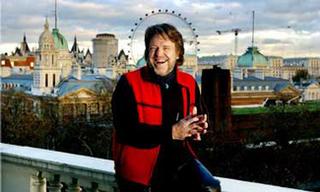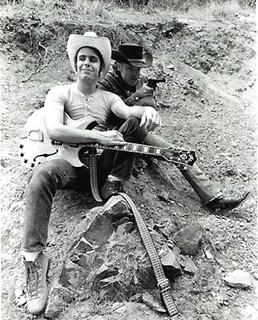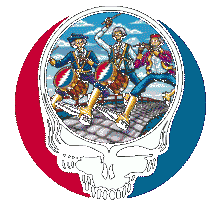The Legend of John Perry Barlow


Listen to Audio Interview here
From JamBase:
THE LEGEND OF JOHN PERRY BARLOW
Uncharted waters must be discovered before they can exist. John Perry Barlow – 57 year-old computer guru, journalist, lyricist, consultant, economist, speaker, father, former rancher, environmentalist, and nomad – is a Cora, Wyoming (population = 70) native who has always forged ahead with the creative perseverance to make waves. Known by Grateful Dead fans as the co-lyricist, with Bob Weir, of some of the Dead's most recognized anthems, he penned "Cassidy," "Mexicali Blues," "Looks Like Rain," and "Estimated Prophet," among others.
But to know him as just a Grateful Dead lyricist is to miss out on an array of colorful tidbits about Mr. Barlow. He has lived a multi-dimensional life since the old days of growing up as a rowdy young hippie in cowboy country, son of Norman Barlow, president of the Wyoming Senate in 1960-61. Barlow took off to the East and graduated from Wesleyan University in Middletown, CT, in 1969. He graduated with high honors in Comparative Religion before operating the Bar Cross Land and Livestock Company - a large cow-calf operation in Wyoming that he sold in 1988. He then dove into the computer world, right as the Internet was but a sprout, and has been credited with coining the term "cyberspace" to describe it.
Around the same time, in 1990, he and Mitchell Kapor founded the Electronic Frontier Foundation, an organization that promotes freedom of expression in digital media, for which he continues to serve as vice chairman.
Barlow has written for a diverse number of publications, including Communications of the ACM, Mondo 2000, The New York Times, and Time. He has been on the masthead of Wired Magazine since it was founded. His piece on the future of copyright, "The Economy of Ideas," is taught in many law schools, and his "Declaration of the Independence of Cyberspace" is posted on thousands of Web sites.
In 1997, he was a Fellow at Harvard's Institute of Politics, and since 1998, he has been a Berkman Fellow at the Harvard Law School. In June 1999, FutureBanker Magazine named him one of the 25 Most Influential People in Financial Services, even though he's not in financial services.
Leslie Peterson, who has known Barlow since he was a kid, called him "one character of a guy." She continued, "He taught himself everything about the computer in what seemed like one night. He has always been brilliant, a good horse hand, skier, extremely sophisticated, and definitely irreverent."
Childhood friend and architect John Carney said, "You could always count on the most interesting people at Barlow's ranch... a Buddhist monk, a rock 'n roll musician, a president's son; people are attracted to him. John has always been frighteningly smart in my opinion... a smart ass too, so he got knocked around a bit as a kid."
With this month being the 40th anniversary of the birth of the Grateful Dead and the 10th anniversary of the death of Jerry Garcia, fans around the country are reflecting upon what made the band and their songwriting legendary. Here's Barlow, in true form, talking about songwriting, his relationship with Bob Weir, politics, his pending 4th Amendment case, and Wyoming in the '60s.
"Governments of the Industrial World, you weary giants of flesh and steel, I come from Cyberspace, the new home of Mind. On behalf of the future, I ask you of the past to leave us alone. You are not welcome among us. You have no sovereignty where we gather."— Excerpt from Barlow's "Declaration of the Independence of Cyberspace." (1996)
So how the hell does a rural Wyoming cowboy kid meet up with the Grateful Dead?
"I was a rebellious kid, and my father was a politician," Barlow began to explain. "Over the course of my fourteenth year, my Mormon Boy Scout troop turned into a motorcycle gang. We all bought little Honda motorcycles. We thought we were a lot worse than we probably were, but the locals thought we were bad enough. My father was told that if he ever wanted to get re-elected anything, he was going to have to get me the hell out of sight. So he sent me off to prep school, and there I met the guy [Bob Weir] who was going to become the rhythm guitar player for the Grateful Dead, and he and I have been one another's official best friend ever since."
Barlow and Weir were two peas in a pod – both having no capacity to follow the rules. Weir eventually got kicked out of Fountain Valley School in Colorado Springs where they had met. Though Barlow wanted to rebel and leave the school as an act of protest, the two didn't reunite until after the Acid Tests.
"I had heard about them [acid tests] and was deeply offended along with everybody else in my sort of Eastern Orthodox Church of LSD," Barlow reflected. "We thought it was a very serious sacrament and should not be handed out in bathtubs for people to drink as much as they want."
Barlow had met and become close friends with LSD purveyor Dr. Timothy Leary while the West Coast acid scene was taking shape. So when the Grateful Dead decided to head east in 1967, Barlow was there to introduce them to a new friend.
"I first saw the Dead the first of June 1967 at a place called Champagne A Go Go, which was a little club in New York that had about 160 seats. Then I took them up to Timothy Leary's estate a couple of days later in Millbrook, New York and got to know them all a lot better... and reconnected with my friend, Bobby Weir, though not before we got the shit kicked out of ourselves sitting underneath the Washington Bridge by some toughs from Long Island who thought our hair was too long. He tried to get them to stop by getting them to sing 'Hare Krishna,' which almost worked."
With LSD becoming a major player in the social scene in the late 60s, it's hard to imagine the Grateful Dead without it, especially with Owsley Stanley around. His obsession with dosing as many people as possible stretched the boundaries further than anyone had anticipated, but perhaps there was a tangible philosophy behind it all. If everyone expanded their senses and could escape their own reality for a few, well, several hours, wouldn't everything change?
"We all had this experience that made us feel like the world that we perceived with our conventional awareness was actually kind of a dream that overlay another reality that was not being taken into account by any of the beliefs or institutions that we knew. In those heady days, I think we all thought that once this insight was generally shared, everything would change. And gradually it is and has. If we had any sense, we would have realized that you weren't going to make a change that fundamental overnight. And, in fact, I think you could make the argument that everything that is going on politically in America is a continuation of that war that was established at that point between the 50s and 60s. Right now, it's still the 50s versus the 60s."
Around 1971, Weir started trying to write songs with Robert Hunter, but they couldn't get along. By this time, Barlow had fallen in thick with the Dead and had been bumming around with them for several years. Caught in the middle of a songwriting battle between Hunter and Weir, Barlow found himself in an unlikely position.
"Hunter turned to me and said, 'Why don't you take him? He's your friend!' I said, 'Well I'm not sure I know how to write songs." He said, 'Well you know how to write poetry,' which was more-or-less true because I had been a poet in college, mostly because I felt like I could ride around on a motorcycle to the women's colleges in New England and recite poetry of my own composition and do OK. I told [Robert Hunter] that I would give it a shot, went out, and tried to write a song, and it was 'Mexicali Blues.'"
"Mexicali Blues" was the first of over twenty-five songs he would go on to pen for the Dead, a majority of which were co-written on his ranch in Wyoming. This was a time when the Dead were going through a cowboy period, so a good cowboy song seemed to fit in just fine. But sometimes the songwriting was more of a struggle, literally.
"Weir and I actually got into a fist fight over one song - 'Feel Like a Stranger.' I was really against that song. It just seemed like (laughs)... like nothing I wanted to write a song about when it started to come, but he was encouraged by the beginnings of it and wanted to make it kind of... Well, he actually turned out to be right, as he was just enough of the time, so I should have known to oppose him as strenuously as I did when I thought he was absolutely dead wrong."
Barlow's catalog of incredible memories with the Dead is more than a book's worth of material, but he opted to share a couple of songwriting memories that stood out as some of the most memorable, for various reasons.
"There was one written in Wyoming, well in large part, which was a song called 'Cassidy.' The chords to that song were written in Marin County in this funny little ranch that we had up in West Marin. There was a girl living on the ranch who had a child the night that Weir was coming up with the chords, and the child was named Cassidy. And subsequently, Bobby came out to Wyoming where we were trying to write songs for his solo album called Ace. We were in an isolated homestead house on another part of the ranch from the main operation... my ranch... and snowed in and kind of crazy, trying to write songs together really for the first time. We fooled around with some words for 'Cassidy,' and nothing much came. Then he had to leave and start recording some of this stuff because he had a tight studio schedule, and we didn't have that one done.
"I found out that my father was dying... took him down to the hospital in Salt Lake. I had to go out with the Caterpillar and plow out a bunch of stack yards so that they'd be able to get the hay sleds in and out while I was gone if I had to be down there with him for a while. While I was out plowing, I kept running those chords around in my head thinking about the girl Cassidy that had been born and also about Neal Cassidy who had died not long before, who had been a great hero of ours. He's one of most remarkable human beings I have ever met. And thinking about how we come in to the world and go out of the world and how there's a kind of continuity. While I was out there plowing snow, the words just formed themselves into a melody that went with the chords and there it was. It just appeared. Then I headed out to watch my father die."
Not only was Barlow writing tunes for the Dead in the 1980s, but he was also starting a family, ranching, and teaming up with Dick Cheney on a number of environmental issues for Wyoming, including passing the Wyoming Wilderness Act and ridding the Wind River Mountains of acid rain. Yeah, that's right - Cheney, but the co-conspirators didn't get along on all of the issues, which eventually led Barlow to write "Throwing Stones."
That's the only explicitly political song we ever wrote. And the story behind that was that I was having a serious argument with Dick Cheney at that point, who I'd helped get elected and been a pretty good congressman for the stuff that I was interested in, which was environmental stuff.
"Then he got into this obsession with the Russians and this conviction that we had a clash of cultures that had to be resolved by whatever means, and so he helped base the MX Missile in Wyoming. And I got so freaked out that somebody was so determined to win a political battle that he was literally willing to endanger all the life on planet Earth that I felt like I had to say something, so I wrote that song. And like I say, I owe Dick a lot for that song."
These days, Barlow is a busy man, working as a consultant and software designer for a British company while also finding time to write some tunes for String Cheese Incident and to hang with his three daughters at Cheese shows. Questioning his experience with SCI brought mixed emotions to the surface.
"They unilaterally changed some things that I wasn't comfortable with having changed, so I'm not sure that I want to do that anymore. But I probably will. I love those guys."
Barlow seems to be as close to Weir as he's ever been. They've spoken about penning more songs together, but their friendship is the first priority.
"The last time we tried, neither of us were happy with the results, and it jeopardized our relationship. At a certain point, you decide whether it's more important to preserve an old friendship than to write a song. Given the various kinds of trouble we've had with one another over the years, I don't know if there's much we could do to destroy that friendship. But nevertheless, it's like being married. It's actually a lot like being married. Bobby has a very interesting mind; it's irregular. Sometimes it can seem like he's just being perverse, and sometimes he is just being perverse. But sometimes he really is on to something and it will take quite a long time for it to be visible."
Aaron DavisJamBase WorldwideGo See Live Music!



2 Comments:
Get off the LSD Barlow, Cheney blew your mind in Wyoming.
The MX missile was a dud. It is no longer operationale.
Why are you hanging on to Cheney's political strings to boost your name recognition.
Your old band had a short fuse.
Kaput.
I'm thinking John PB and JOHN John and Juan an old GMC 1947 hummmmm internet freedom and Barlow was born in 1947 said he worked with his hands 17 years hummm 107 Be well RIP John Perry will you return as one of the greatful dead? like JOHN? Be Well My Friend
Post a Comment
<< Home